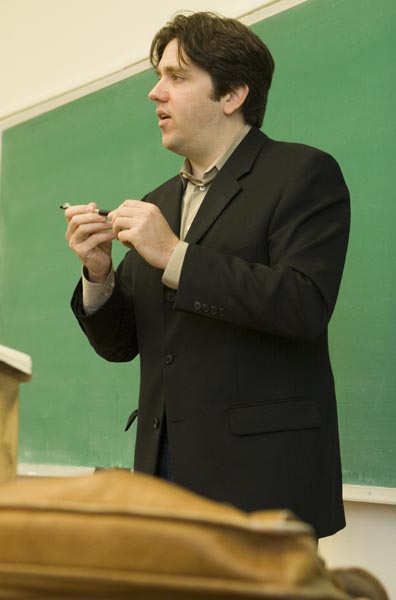Instructor brings awareness to Korean War, veterans

Professor Epperson discusses the infinite possibilities of what a pen could not be in his History of Philosophy class.
April 18, 2008
As soldiers prepared to defend the hill from yet another wave of attacks, they replaced their fallen, but their bravery did not falter.
“You’re human; I’m human: We’re going to get through this battle,” Michael Epperson said of the feelings soldiers had as they defended Outpost Harry in what he described as a little-known battle in a little-known war.
“All that mattered (to the soldiers) was that they completed the mission, and that was to survive the night,” Epperson said. “And then it happened again the next night ? and the next night – it just kept going.”
Epperson, a philosophy instructor at Sacramento State, is in the midst of creating a documentary entitled “Outpost Harry,” about an underemphasized battle in the Korean War.
Greek and American soldiers defended “Outpost Harry” – while being outnumbered 30 to 1 – from Chinese Communist Forces in the Korean War from June 10 to June 18, 1953, but Epperson knows that not many people are aware of it.
What excites Epperson about the documentary is the human aspect of the battle.
“It’s about veterans telling their story,” Epperson said. “There’s a whole new dimension opened up when you talk to these people.”
Epperson said that people have criticized him about being a philosophy professor making history documentaries, but he pointed out that history and philosophy have some important things in common, namely: humanity and ethics.
“It is connected,” Epperson said.
Humanity drives Epperson’s focus in “Outpost Harry,” and that’s why human accounts of the battle will make up a majority of the documentary.
The reenactments of events will strike a balance between the veterans’ memories and the encyclopedia’s version of events. He described veterans remembering Chinese soldiers who had blue vials that those enemies would break open, drink the contents of and then become exceedingly athletic and durable.
There is no record of this in encyclopedias. Epperson said that the documentary won’t assert that enemy soldiers definitely had those vials, but the reenactments will depict them.
Epperson has written and created many works that have helped prepare him for this undertaking.
Epperson’s mother, Liz Dokimos, feels that Epperson has always been inclined toward these pursuits.
“Mike has always been an ambitious person,” Dokimos said. “Driven by his curiosity and interest in many areas … science, computer technology, writing of fiction, plays and screenplays, music composition and playing reed and keyboard instruments, acting, and, ultimately, philosophy. He has worked hard to develop proficiency in each.”
He’s written books, additional book chapters and articles, plays, screenplays and films. He was even a “Star Trek” pitch writer for a time; he once wrote a feature script that was optioned for a year.
While Epperson’s interest in “Outpost Harry” is in the philosophical aspects of war, he said that his brother, Christos, who is directing “Outpost Harry,” is a huge history buff.
“The details have to be just right,” Epperson said.
Christos Epperson was a field director for the Discovery Channel and also directed the Epperson brothers’ 2005 documentary, “The 11th Day.”
“The 11th Day” is about the Cretan civilian resistance against Nazi occupation in World War II, and that documentary conferred much credibility upon the Epperson brothers.
“The 11th Day” has been acquired by museums all over the world and was lauded by publications. The Chicago Tribune called it a “stirring documentary” and Chase Brandon, a 30-year veteran operative of the CIA, called it “one of the greatest untold stories of World War II.”
Museums that have acquired the documentary include the National World War II Museum in New Orleans, the CIA Museum at CIA Headquarters, and Britain’s Imperial War Museum.
These projects are a lot of work, but Epperson does not feel like teaching at Sac State is a distraction from his research.
He noted that one seems to help the other.
“Many of the problems I’m working on in the research are major features of the ancient and early modern philosophy courses I teach,” he said. “So it’s a great exercise for me to revisit these problems every semester with my students. Best of all, there are sometimes moments where a student will raise a concern I wasn’t prepared to answer. Those occasions are the best kind of fuel for me, and they always find their way into the research.”
After finishing with Outpost Harry, Epperson is looking forward to utilizing a large research grant for Sac State.
“I’m not sure what this grant will mean for Sac State. A research grant this size is definitely new territory for me, but my goal is that the work will reflect well on the university and my colleagues in the philosophy department,” Epperson said. “Although I’ve only been teaching here a couple of years, my mom was a professor at Sac State for over 30 years, and I have been walking this campus since I first learned how to walk. So it’s great to be able to do this work here.”
Jesse Fernandez can be reached at [email protected]




























































































































